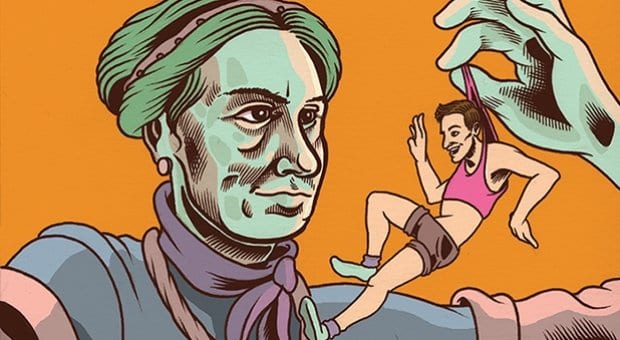History has a tendency to overlook the fact that women exist. For every Marie Curie, Elizabeth I or Ada Lovelace, you can probably think of 10 better-known men. On top of being consigned to the margins of history, women’s sexuality has been demonized or ignored. Thankfully, many women have fought against being cast aside; queer writers are especially important, because the words they left behind map their stories and desires. Alongside names like Sappho and Virginia Woolf, I think of British-born, Canadian-American poet, journalist and philosopher Elsa Gidlow.
She was born Elfie (a name she hated and later changed) on Dec 29, 1898, in Hull, England, and when she was six, her family moved to Tétreaultville, Quebec. At the age of 17 she took a job in the office of a railway parts manufacturer. There, she developed a crush on a woman named Francis, whom she’d met at business school, and soon after became aware that a female co-worker was in a same-sex relationship. She came to understand her romantic and sexual feelings for women and wrote in her diary, “I am going to get a room of my own. I am going to find my kind of people.”
As part of her burgeoning identity she established herself as a poet, creating a poetry group in Montreal, where she met a beautiful, effeminate young man named Roswell Mills, a 19-year-old editorial assistant at The Montreal Star. Mills was more involved in the gay community and became a major influence, introducing Gidlow to the first few women she developed feelings for.
When Gidlow was in her early 20s, she became involved in the United Amateur Press Association of America (UAPAA). Through the organization she became a rival of the influential horror writer, amateur journalist and notable racist HP Lovecraft. Gidlow and Mills started what could be considered Canada’s first gay and lesbian publication, Les Mouches Fantastiques. “Besides our poetry, [Mills] contributed translations from Verlaine, articles on ‘the intermediate sex,’ and one-act plays sympathetically presenting love between young men. My poetry was obviously addressed to women,” Gidlow wrote in her autobiography.
In the years after 1920, Gidlow moved to New York, San Francisco and Fairfax, California, working as an editor, journalist and poet. She had a number of lovers and girlfriends, including a long-term relationship with Scottish golfer Violet Winifred Leslie Henry-Anderson, nicknamed “Tommy,” whom she met through Mills. The golfer lived openly in society and “was able to tell me more than I had ever suspected of women’s passionate, romantic involvement with one another.” One evening Henry-Anderson slipped a ring on Gidlow’s finger inscribed, “Vincit qui patitur — They conquer, who endure,” and the two were married every way but legally. They were inseparable for 13 years until Henry-Anderson died of lung cancer in 1935, devastating Gidlow.
Gidlow travelled widely, meeting such notable gay people as Magnus Hirschfeld, the German father of sexology, and novelist Radclyffe Hall, author of The Well of Loneliness. After Henry-Anderson’s death, Gidlow purchased some land outside San Francisco. At Mills’s insistence, a new lover, Isabel Quallo, moved in, and the two later moved to a larger, remote piece of land Gidlow named Druid Heights. This became a mecca for artists, spiritualists and young lesbians who saw the poet as a leader. She never stopped writing and was widely published, with her most well-known work being On a Grey Thread. Elsa, I Come with My Songs is possibly the first published autobiography written by a lesbian. She died of natural causes at Druid Heights at the age of 87.
Gidlow bridged the dying sentiments of a stuffy Victorian era and the political hodgepodge of the modern age. Though it is impossible to sum up her complex life in so few words, her work marks her as a pioneering gay woman of the 20th century. This snippet of “For the Goddess Too Well Known” expresses her desires proudly and poetically:
I break wild roses, scatter them over her.
The thorns between us sting like love’s pain.
Her flesh, bitter and salt to my tongue,
I taste with endless kisses and taste again.
At dawn I leave her
Asleep in my wakening garden.
(For what was done there
I ask no man pardon.)


 Why you can trust Xtra
Why you can trust Xtra


